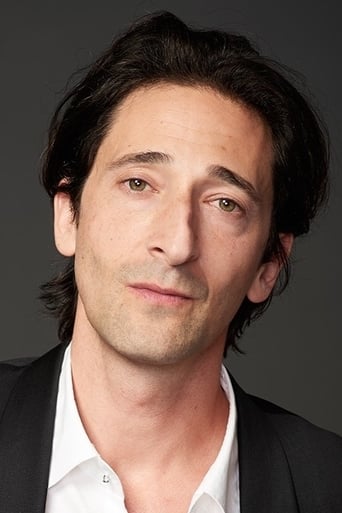Kattiera Nana
I think this is a new genre that they're all sort of working their way through it and haven't got all the kinks worked out yet but it's a genre that works for me.
Alicia
I love this movie so much
Cathardincu
Surprisingly incoherent and boring
TaryBiggBall
It was OK. I don't see why everyone loves it so much. It wasn't very smart or deep or well-directed.
sergelamarche
The true story seems to have been cleaned for the film, but it adheres to the historical account somewhat. Jeanne seemed to have been quite a liar in real life while Hilary is scrumptious and hautaine. Good story for the film, comedic at times.
classicalsteve
The costumes are lavish, the sets lush and resplendent. The story is compelling: how a strange affair of court intrigue becomes part of a larger mosaic of incidences that will eventually bring down the French monarchy. As a backdrop to the main events of the film is the rising unrest of the French citizenry who are becoming more and more disillusioned with their monarchy. A couple of great actors, most notably Jonathan Pryce as Cardinal Rohan, stand out. And yet, although much of the film is there, it is not quite all there. Unfortunately for all its splendor, the final piece needed to make the movie a triumph is lacking: a leading lady right for the part. And maybe some adjustments in the music department.First the positives: Despite a number of misgivings, this film still has the one element I always look for in any film: is the story compelling enough that, at any given moment, I care about what will happen next and it is not obvious what will happen next? And this movie definitely possesses the required attribute. Few movies have this rather simple facet, and yet, for me, it is often what will make or break a film regardless of the genre. Films as diverse as Star Wars: The Empire Strikes Back, Amadeus, and The Sting have the notable quality of being unpredictable until the very end. These last examples are of course masterpieces of film-making where Necklace is not. It's a good film with a good story but not one that will make any critics' lists.The story of The Affair of the Necklace is extremely complex involving a countess, the Cardinal of France, the Queen of France, a gigolo, a sorcerer/psychic, a couple of jewelers, a peasant actress, forged letters, and a necklace of tremendous value and prestige. From the start, we know who did it, and the story back-tracks to tell us how and why the intrigue was perpetrated.Now the not-so-good news: Hillary Swank, a 2-time academy-award-winning actress, is miscast for the part. The rest of the cast acclimates relatively well to late 18th-century France except for her. At times she seems to be playing a character more akin to an early 20th-century debutante than an 18th-century former member of the aristocracy. At times, some of her scenes appear contrived to provoke pity. The character is portrayed on the more innocent and vulnerable side of the female-character spectrum. This seems a bit hard to swallow as this woman is also a mastermind behind an intrigue that may have contributed to the downfall of the aristocracy. Maybe someone like Helena Bonham-Carter would have been a better choice...The music is also inconsistent. For the majority of the movie, 18th-century and even 17th-century music is heard which seems appropriate as this is a period picture. I noticed a brief excerpt from the Monteverdi Vespers of 1610 in one of the church scenes. At other times, "original" music sounding a lot like Enya is played which always ruins my "disbelief". It reminds me we are in a movie made a couple of centuries after the events that are taking place. The filmmakers would have probably saved a lot of time and money by sticking to period music and not hiring a composer who writes new age music.That said, this is still a good film when good films are uncommon. Perfect, not by a long shot. The script? Inconsistent but has its moments. Absorbing? Definitely. If you like period pictures, particularly those portraying pre-1800 Europe, you will still get a lot out of The Affair of the Necklace.
Andy (film-critic)
The Affair of the Necklace is a surprising film for one that falls within the dreaded period piece genre. Whenever I watch films of this nature I typically feel like I have seen the story time and time again. A mismatched couple finds love together, only to have some tragedy befall them by the end of the film. It is the classic "Pride & Prejudice" scenario mixed with a blend of "Wuthering Heights". It is sad because for a very long time Hollywood couldn't release a film that redefined the genre. Most viewers avoided these types of films because of the cliché nature coupled with the dull, monotonous acting that could only be accomplished by a short-list of actors. To me the genre is painful, but this film doesn't seem to fit within that age-old mold. What makes this film stand out from the rest within the genre is the fact that screenwriter John Sweet gives us deception and intrigue with our characters, coupled with a story that you would see in typical mainstream cinema. While it may be based on a true event, Sweet's story, coupled with the decent eye of director Charles Shyer (of Baby Boom fame) gives us a modern twist instead of the stale comradery that this genre is commonly used to.What makes this film stand out is that Shyer doesn't hide anything from us. This can be both a positive and a negative because it doesn't keep you guessing until the end. You know what is going to happen, it isn't sympathetic in nature, but instead demonstrates the power of the human desire and the corruption of the human "need". What I found interesting about this film is the contrast between the class that Swank tries to fit within and that of the upper class citizens of Versailles. All that she wants is to be a part of her family's history, which is that of wealthy and social standing, while it is that upper class that ultimately destroys the reputation of France. Swank's character Jeanne is shown to become a symbol of the common class, but in reality she is just trying to reach up into a wide open sky. The struggle then becomes rather confusing as Shyer wants us to feel sympathy for the obvious villain (Pryce) or are we to feel sympathy for the central character, Swank, which commits evil deeds for her own self righteousness. While some will argue that this is a downfall to the film, I kind of enjoyed it. I liked seeing my mind flutter between the two, knowing that one seems evil and the other is evil. It was creative for this period piece to see the story unfold from the eyes of the thief instead of the savior. This worked until the end, when Shyer demanded sympathy from us and, in my case, found none. By the end, I could not care what happened to Swank because she had it coming to her all along, from the beginning we see her mind reacting to situations, and this one happened to put her in the hypothetical "hot seat". It was this internal struggle with this film that really made Shyer's outing stand apart from the rest in the genre.While I would agree with most film critics that Swank is an actress that is not afraid of sinking her teeth into a role, I did feel that this singular role was not made for her shoes. Swank seems "silly" as Jeanne, attempting to bring a level of emotion to a character that felt more snobbish and jealous than honest. Her smile, her actions, her sex-appeal just wasn't prevalent in this film, nor did it work. This was her first feature role after Boys Don't Cry, and I think that Shyer really just wanted to ride the Oscar bandwagon, without thinking further within his character. Pryce is … well … Pryce. If you have seen one of his period piece films, then you have seen him in this one. I think directors know he looks like someone from that period, so he is instantly cast. Simon Baker is a decent choice to play the gigolo; he seems to have the smile that could melt women. Adrien Brody seemed to come out from left field for this film. He is a great actor, but he was used as a classic "reveal" in this film. A surprise known actors comes in during the center of the film to bring viewers out of the possible sleep they could be facing. Christopher Walken, a actor that I believe rules this generation of cinema, was odd in this film. I kept waiting for him to yell, "COWBELL, this film needs more COWBELL". He wore a strange mustache and odd hair, but was fun none the less. Alas, Antoinette herself could have been better played than through the eyes of Joely Richardson. While she may be a decent actress, this was just too goofy for her. While I loved Sweet's story, it was Shyer's choice of casting that really hurt the overall sensation of this film.Overall, I could suggest this film to friends and family. I thought, outside of the performances, that the cinematography was beautiful, the change of direction from your normal period piece drama was a breath of fresh air, and that Shyer did a decent job of placing a new spin on a tired genre. There are some major sparks to this film, but it just didn't light a full fire in my eyes. The addition of Alanis Morissette's hypnotic voice to the opening and closing to this film added a strong undertone that set the pace for the rest of the film. It was a strong film for Shyer; redefining a genre is smart, but he could have strengthened his directing arm a bit more by adding crucial actors to better roles and a less empathy towards the true villain.Grade: *** out of *****
Hans C. Frederick
The infamous,and evil Giuseppe Balsamo,aka Alessandro,Count of Cagliostro,was arguably the most notorious fraud,charlatan,and bunko artist of the 18th century.And,as reliably portrayed in this story,he fit in rather nicely with the rest of the corrupt opportunists and swindlers.Having worked for 8 years as a prison psychologist in Ohio,it's been my observation that there are no guilty persons incarcerated.Instead,it seems as though the legal profession must be among the most corrupt and incompetent in existence.All of these innocent persons being advised by their counsel to plead guilty.My own observations is,that if they're not guilty of the offense for which they're being currently incarcerated,they ought to think about all the evil things that they've done and for which they've escaped punishment.It all comes out even in the wash,so to speak.So it goes with Cagliostro.While perhaps not legally culpable,he was certainly involved in this morally.And he DID escape punishment from the French.yet,he eventually got his.He moved to Rome.and opened a Masonic Lodge.Now,in Europe,the Masons aren't a men's service organization;They happen to be viewed as heresy.So,Cagliostro was arrested,brought before the Inquisition,and received the capital sentence.The Pope commuted the sentence to life imprisonment,and he spent the rest of his life in prison.MORAL:WE really don't need anyone else to foul up our lives,now,do we?We usually do a great job on our own.





